|
|
|
Sort Order |
|
|
|
Items / Page
|
|
|
|
|
|
|
| Srl | Item |
| 1 |
ID:
118003
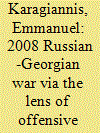

|
|
|
|
|
| Publication |
2013.
|
| Summary/Abstract |
The Russian intervention in Georgia's breakaway republic of South Ossetia in August 2008, Moscow's first-ever use of military force against a sovereign state in the post-cold war period, deserves a theoretical explanation. By following the tenets of Offensive Realism, this article will argue that the US-Russian competition in the South Caucasus is the main cause of the 2008 Russian-Georgian war. During the 1990s, the USA passed the buck to Turkey to contain Russian influence in the South Caucasus. In the early to mid-2000s, however, the Russian-Turkish relations were improved so rapidly that the USA opted, through NATO expansion, to step in as an offshore balancer. Following Bush administration's decision to support the Georgian candidacy for NATO membership and Georgia's ill-fated attempt to seize South Ossetia, Moscow went to war to re-establish hegemony in the South Caucasus. In this way, as the theory of Offensive Realism claims, the Kremlin believes that Russian state will enhance its chances of survival in the anarchical international system.
|
|
|
|
|
|
|
|
|
|
|
|
|
|
|
|
| 2 |
ID:
106565
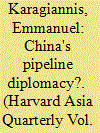

|
|
|
| 3 |
ID:
133505
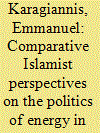

|
|
|
|
|
| Publication |
2014.
|
| Summary/Abstract |
The article will describe the general Islamic approach on energy based on the Sunnah of Prophet Muhammad, as well as the writings of prominent Muslim thinkers. Then it will examine and compare the energy perspectives of four Islamist groups: Hizballah, Hizb ut-Tahrir, the Muslim Brotherhood, and Al Qaeda. It will be argued that Islamist groups have attempted to achieve their external energy objectives by either using violence or exercising political blackmail against their opponents. Moreover, Islamists have developed globalized, glocalized, or localized "scale of engagement," depending on the targeted audience. Finally, the article will examine the security implications stemming from Islamists' interest in energy issues.
|
|
|
|
|
|
|
|
|
|
|
|
|
|
|
|
| 4 |
ID:
133094
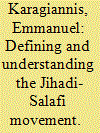

|
|
|
|
|
| Publication |
2014.
|
| Summary/Abstract |
Jihadi-Salafi groups have been on the march in the post-9/11 years on a violent campaign to achieve their ends. From North America to South-East Asia and from Europe to Sub-Saharan Africa, Jihadi-Salafis have attacked Western and local targets with often devastating results. Despite growing attention to the Jihadi-Salafi movement, which includes both globalized and localized components, there are still questions that remain largely unanswered. Three new books can shed light on this modern phenomenon that has preoccupied Western security policies for the past decade. Jihadi-Salafism is a large and diverse movement with a global reach that has embarked on an armed struggle to defend the imagined ummah.
|
|
|
|
|
|
|
|
|
|
|
|
|
|
|
|
| 5 |
ID:
120325


|
|
|
|
|
| Publication |
2013.
|
| Summary/Abstract |
No matter how unlikely it may seem, radical Leftists and Islamists have come closer in recent years. Drawing on substantial ideological interchange, and operating at both state and non-state levels, the two movements are building a Common Front against the United States and its allies. In this article, we use framing theory to examine the contemporary convergence of political Islam and the radical Left. Both radical Leftists and Islamists have utilized the master frame of anti-globalization/anti-capitalism and the master frame of anti-colonialism/anti-imperialism to elicit support from the widest possible range of people. The emerging Red-Green alliance presents a complex challenge that will require careful attention from U.S. and European policymakers.
|
|
|
|
|
|
|
|
|
|
|
|
|
|
|
|
| 6 |
ID:
125922
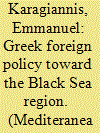

|
|
|
|
|
| Publication |
2013.
|
| Summary/Abstract |
Greece has enjoyed strong historical and cultural ties with countries and peoples of the Black Sea region for many centuries. During the 1990s, Greek governments largely ignored the region as they focused on the immediate Balkan neighborhood, which was in turmoil at the time. Since the early 2000s, however, Athens has developed a multidimensional policy toward the Black Sea region that deserves to be examined. This policy is based on a combination of hard and soft power resources, including economic might, military diplomacy, pipeline development, public diplomacy, multilateralism, and outreach based on political values, culture, and history. While the formation and implementation of the Greek foreign policy has remained in the hands of state officials and agencies, nonstate actors have had an important contributing role. The extent of Greek Black Sea policy's success and limitations are also discussed.
|
|
|
|
|
|
|
|
|
|
|
|
|
|
|
|
| 7 |
ID:
069624
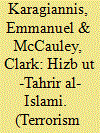

|
|
|
| 8 |
ID:
070178
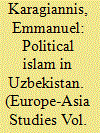

|
|
|
| 9 |
ID:
077748


|
|
|
|
|
| Publication |
2007.
|
| Summary/Abstract |
Hizb ut-Tahrir is a transnational Islamic movement that aims to unify Muslims worldwide under a single Caliphate. The group presents a particularly difficult challenge to the Kazakh government, since it holds radical views but advocates only peaceful change. The article shows how social movement theory can illuminate the emergence of Hizb ut-Tahrir in southern Kazakhstan. Furthermore, it suggests that the group's ideology can be understood as a powerful and integrative basis for collective action
|
|
|
|
|
|
|
|
|
|
|
|
|
|
|
|
| 10 |
ID:
135338


|
|
|
|
|
| Summary/Abstract |
Russian interventions in South Ossetia and Crimea indicate a major shift in Moscow's policy towards the former Soviet republics. This article compares the two interventions in terms of military performance, basis of legitimacy, and motivational goals. This confirms the formation of a new and more assertive Russian policy in the region. Although there were significant differences between the two interventions, improved Russian military capabilities reveal the Kremlin's plans to project power in the near abroad. The Russian leadership used similar legal justifications for the two interventions, based on the Kosovo precedent, opening the possibility of further military action in the former Soviet space. Notwithstanding the legal excuse, Moscow mainly intervened in Georgia and Ukraine to prevent further NATO enlargement eastwards, regain geopolitical influence regionally, and respond to perceptions of insecurity and a sense of humiliation. With the possible exception of the Baltic States, the rest of the former Soviet republics could, sooner or later, fall under Russia's sway. It is a challenge that the West can choose to confront either with tougher sanctions and more involvement in the region, or by initiating a new process of socializing Russia into the international community, with security assurances and economic incentives in return for acknowledgement of Russia's role as a great power
|
|
|
|
|
|
|
|
|
|
|
|
|
|
|
|
| 11 |
ID:
125904
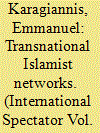

|
|
|
|
|
| Publication |
2013.
|
| Summary/Abstract |
Western Muslims have joined jihadi groups in Afghanistan/Pakistan, Somalia and Syria to defend Islam from its perceived enemies. Transnational Islamist networks have played a pivotal role in bringing them to conflict zones by fulfilling three functions: radicalisation through mosques, radical preachers, and the Internet; recruitment which can be conducted either physically or digitally; and identity formation that provides the radicalised recruits with a larger cause to fight for as members of an imagined global community. Transnational Islamist networks are multifunctional entities on the rise.
|
|
|
|
|
|
|
|
|
|
|
|
|
|
|
|
|
|
|
|
|